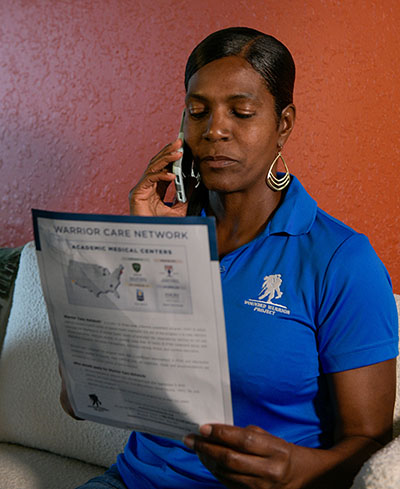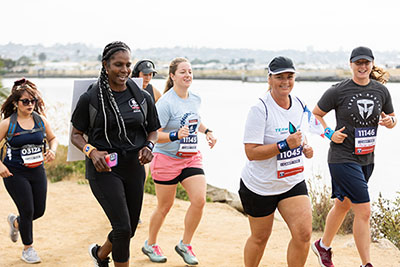Virtual Reality Helps Veterans Relive the Past to Reclaim Their Future

Technology is changing mental health care. It is creating new ways to heal after trauma.
When Army veteran Tonya Oxendine's post-traumatic stress disorder (PTSD) led her to consider driving off a bridge to end her life, she thought about the future. She did not want to leave a legacy of suicide for her children. Yet, to heal and overcome the suicidal thoughts that had crept into her life, she needed to address her past. Painful memories were overshadowing her life.
New technology would soon change that, in the form of virtual reality.
Post-traumatic stress disorder is one of the most common health needs among military veterans. According to Wounded Warrior Project® (WWP)’s Annual Warrior Survey, 3 in 4 warriors reported living with PTSD in 2022. It is the second most common health issue reported by those surveyed.
When WWP matched Tonya with virtual reality therapy through Warrior Care Network®, she was skeptical.
"You want me to put a bunch of equipment on my head to watch my worst nightmare come back to life - right down to the sounds, smells, and even the air temperature?” she said. “I'm not going to lie; I was scared."
Tonya signed up. The warrior in her told her not to let fear rob her of the breakthrough she deserved.
How Does Virtual Reality Therapy Help Treat PTSD?
After therapists interviewed Tonya, experts rebuilt her memory in an interactive virtual world.
"I knew I'd be OK once I met the support team,” Tonya said. “These doctors were letting me take it at my own pace. I was also going through the program with fellow warriors. No one was judging me for what I had been through."
Warrior Care Network® has been offering this type of treatment, known as prolonged exposure therapy, for more than a decade. It is known to be particularly effective for veterans. Through the use of virtual reality headsets and the building of virtual worlds, veterans can re-experience the past without traveling to where it occurred or confronting the people involved.
"PTSD is a disorder of avoidance, and spending your life avoiding things that remind you of the past can severely limit how you experience the world," explained Dr. Erin Fletcher, director of Warrior Care Network. "This treatment helps you face the past head-on and develop tools and skills to take back control from those memories."
Tonya completed the two-week accelerated treatment program through Warrior Care Network and went on to rebuild her life. She broke out of her isolation and spends more time enjoying the things she loves, like fitness and family.
What's Next for the Future of PTSD Treatment?

Wounded Warrior Project is funding research that is exploring whether artificial intelligence can help predict how a veteran will respond to different types of treatments, even before their first session.
"Not every treatment works for everyone,” Erin said. “Many warriors come to Wounded Warrior Project saying they've tried other things for their mental recovery but have not gotten the results they want. We're looking at ways AI can help match them to the right treatment and adjust that care in real time, reducing frustration and disappointment.”
Whatever the future of PTSD holds, WWP will continue to push for the changes necessary to meet and adapt to the needs of military members and their families.
“We listen to warriors and build solutions that ensure they can find the resources that fit their unique journey. That is how Warrior Care Network came to be, and we are thankful to the supporters who empower us to carry out this mission,” Erin said.
Contact: — Kaitlin Fohlin, Public Relations, kfohlin@woundedwarriorproject.org, 904.776.7169
About Wounded Warrior Project
Since 2003, Wounded Warrior Project® (WWP) has been meeting the growing needs of warriors, their families, and caregivers — helping them achieve their highest ambition. Learn more.